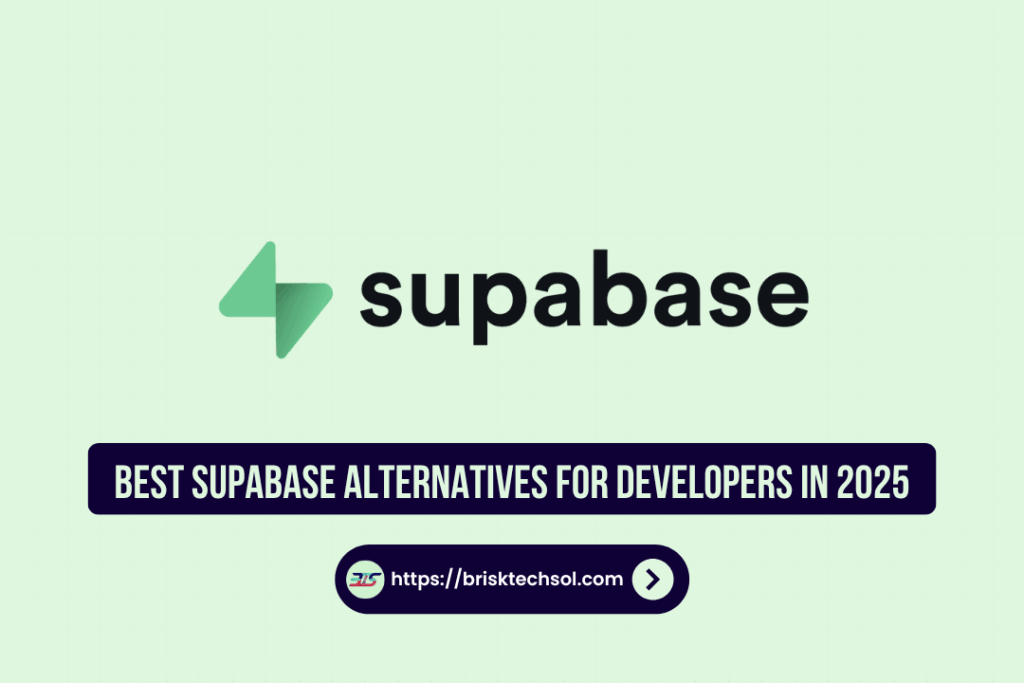If you’ve been exploring backend solutions for your web or mobile app, you’ve probably come across Supabase. It’s fast, feature-packed, and open-source. But what if it doesn’t quite fit your needs? Whether you’re hitting a scalability limit, looking for a different tech stack, or just exploring other options, you’re not alone in seeking a Supabase alternative.
In this guide, we’ll break down exactly what Supabase is, when it might fall short, and which other platforms you should consider instead. Let’s make your backend decision simpler.
What Is Supabase?
Imagine Firebase, but built entirely on open-source tools. That’s Supabase in a nutshell. It offers real-time databases, authentication, storage, and auto-generated APIs all powered by PostgreSQL.
Core features include:
- PostgreSQL database
- Real-time updates
- User authentication
- File storage
- RESTful & GraphQL APIs
Why developers like it: Supabase gives you a familiar SQL-based experience with modern backend functionality, and you can self-host it if needed.
But like any platform, it has trade-offs.
When Should You Look for a Supabase Alternative?
Let’s say you love the idea of Supabase, but you run into one or more of these issues:
- You need a NoSQL database instead of SQL
- Self-hosting isn’t flexible enough for your team
- You want built-in GraphQL, not a plugin
- Pricing becomes a concern at scale
- You need specific enterprise-level features that Supabase doesn’t offer
If any of those sound familiar, it might be time to explore other options.
What to Look For in a Supabase Alternative
Before we jump into the list, here are some features to keep in mind as you evaluate alternatives:
- SQL or NoSQL database support
- Real-time capabilities
- User authentication & role-based access
- Storage options
- GraphQL or REST API support
- Hosting flexibility (cloud-managed vs self-hosted)
- Pricing and scalability
Top Supabase Alternatives in 2025
Let’s take a closer look at the top platforms developers are using when Supabase isn’t the right fit.
1. Firebase (by Google)
If you need lightning-fast real-time data syncing and don’t mind using a NoSQL database, Firebase might be your go-to.
Pros:
- Realtime database and Firestore
- Authentication and analytics built-in
- Strong mobile support (iOS/Android SDKs)
Cons:
- Uses NoSQL (JSON-based)
- Less transparent pricing
- Vendor lock-in risk
2. Appwrite
This open-source alternative has been gaining traction quickly, especially with developers who want more control.
Pros:
- Self-hosted and open-source
- Supports multiple runtimes (Node, Dart, Flutter)
- Modular and extensible
Cons:
- Smaller community
- Newer, so may lack certain enterprise tools
3. Nhost
If you’re team GraphQL, Nhost will feel like home. It’s similar to Supabase but GraphQL-native.
Pros:
- Built on Hasura + PostgreSQL
- Real-time GraphQL support
- Easy to deploy and scale
Cons:
- Smaller ecosystem
- Not ideal if you prefer REST APIs
4. PocketBase
This is a minimalist backend written in Go. Great for prototyping and small apps.
Pros:
- Easy to use and lightweight
- Includes built-in auth and file storage
- Can run as a single executable
Cons:
- Less scalable for large applications
- Community is still growing
5. Hasura
For those who want GraphQL superpowers and don’t mind rolling some of their own backend.
Pros:
- Instant GraphQL on PostgreSQL
- Great for real-time apps
- Scalable with enterprise support
Cons:
- Can get complex for beginners
- Requires some backend configuration
6. Backendless
A visual backend builder for those who like low-code solutions.
Pros:
- Drag-and-drop logic
- Realtime data sync and messaging
- Push notifications, user management
Cons:
- Free plan is limited
- Less control compared to full-code platforms
7. AWS Amplify
Looking to stay in the Amazon ecosystem? Amplify offers robust backend services backed by AWS.
Pros:
- Deep AWS integration
- Full-featured backend suite
- Highly scalable
Cons:
- Steep learning curve
- Can feel overwhelming for small projects
Supabase vs Firebase vs Nhost (Quick Comparison Table)
| Feature | Supabase | Firebase | Nhost |
|---|---|---|---|
| Database Type | PostgreSQL | NoSQL (Firestore) | PostgreSQL |
| Realtime Capabilities | Yes | Yes | Yes (via Hasura) |
| GraphQL Support | Partial | No | Full |
| Auth Built-In | Yes | Yes | Yes |
| Open Source | Yes | No | Yes |
| Self-Hosting | Yes | No | Yes |
| Ideal For | SQL lovers | Mobile-first apps | GraphQL-first apps |
How to Choose the Right Supabase Alternative
So, which one should you choose?
Here are a few simple guidelines:
- If you’re building a mobile app with real-time updates, Firebase is hard to beat.
- Need open-source + GraphQL? Check out Nhost or Hasura.
- Want full control over your backend? Appwrite or PocketBase are worth a try.
- Building something at enterprise scale? AWS Amplify or Hasura might be the answer.
It all comes down to your project’s specific needs.
Final Thoughts
Supabase is an excellent tool, but it’s not the only one. Depending on your goals whether it’s more flexibility, a different database model, or specific features there are plenty of alternatives that might serve you better.
The best part? Most of these platforms are either free to try or open source. So go ahead, test a few, and find the backend that feels right for you.
FAQ’S
What is better than Supabase?
It depends on your use case. Firebase is better for mobile, Nhost for GraphQL, and Hasura for scalable GraphQL APIs.
Is Firebase a good alternative to Supabase?
Yes, especially for real-time apps with a mobile-first approach and if you prefer NoSQL.
Can you self-host Supabase alternatives?
Yes, Appwrite, PocketBase, Hasura, and Nhost all support self-hosting.
Which Supabase alternative supports GraphQL?
Nhost and Hasura offer built-in GraphQL support. Supabase requires plugins for full support.
Is Supabase better than Hasura?
Supabase is easier for beginners; Hasura is better for complex, high-performance GraphQL APIs.









